#organic soil for vegetable garden
Text
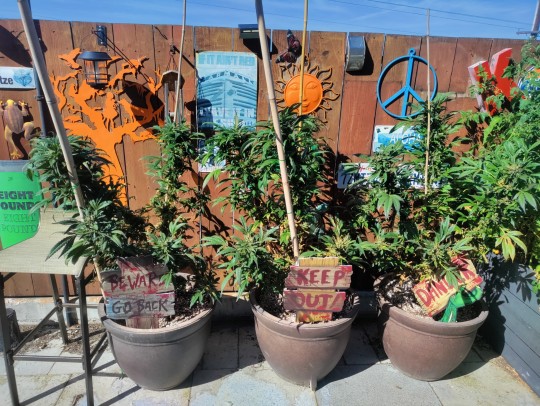
Harvest day 10/15/2023
Week #12
Flower #8
Gruntz

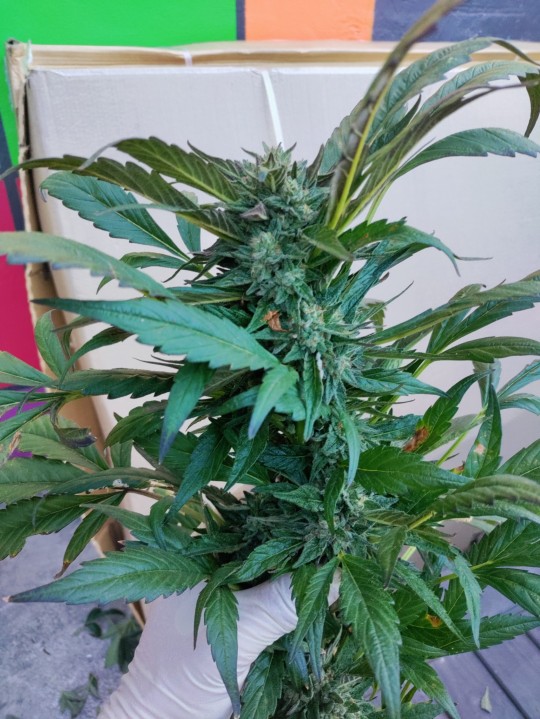


#homemade#cannabis#smoke weed#homegrown#weed#bong tokes#bong#707 soil#soil#bong hits#backyard#organic soil for vegetable garden#organic#fox farm
3 notes
·
View notes
Text
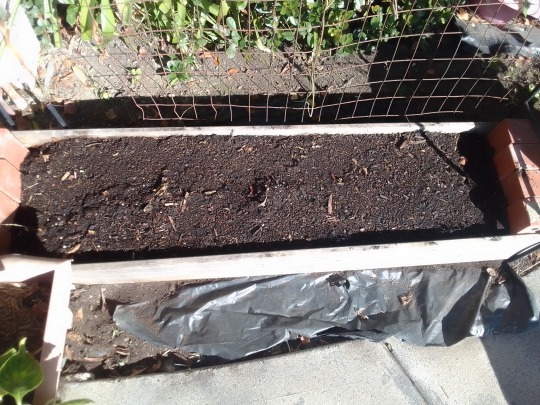
I'm a renter so investing in garden infrastructure is a balance and a compromise.
Mine is a garden of poverty. Found objects, repurposed items, cheap tip finds, composting, creativity and elbow grease is what my various vegie gardens run on.
Everything you see here I got for free. Wood lengths and a wire trellis from a curbside rubbish pile and bricks that were onsite when I moved in. This is all packed together between the legs of a garden arch which I bought cheap several years ago.
Today I refreshed the soil with 50% home sourced ingredients. Pea seeds saved from last season will go in soon. This DIY box will be feeding me again shortly.
This is how I spent my Earth Day. I hope your Earth Day was equally rewarding.
#garden#gardeners on tumblr#gardening#vegetables#home grown#self sufficiency#minimal waste#zero waste#plants#organic food#Earth Day#soil#DIY#repurposing#renting
11 notes
·
View notes
Text
Learn about the health benefits of gardening
#GardeningVibes#Gardening#Horticulture#Landscaping#Plants#Flowers#Vegetables#Garden Design#Organic Gardening#Soil Care#Garden Tools#Watering Techniques#Pest Control#Composting#Pruning#Seasonal Planting
2 notes
·
View notes
Text
How to grow vegetables in 6 simple steps?

Don't know where to start with your own vegetable garden? Check out our new infographic on How to grow vegetables in 6 simple steps! From selecting the right seeds to harvesting your bounty, our easy-to-follow guide will have you growing your own fresh produce in no time.
Visit www.yardener.com for more gardening resources.
Want more gardening resources? Check here
#Vegetable gardening#Gardening tips#Growing vegetables#Step-by-step gardening#Home gardening#Vegetable cultivation#Gardening for beginners#Organic gardening#Planting vegetables#Vegetable garden care#Gardening techniques#Growing your own food#Vegetable gardening guide#Sustainable gardening#Garden planning#Soil preparation#Free Gardening Information#Pest control in gardens#Yardener#Garden maintenance
3 notes
·
View notes
Text
How To Compost At Home

Composting is a natural process that turns organic materials, such as food scraps and yard waste, into a nutrient-rich soil amendment. It is an easy and effective way to reduce the amount of waste in landfills and improve the quality of soil in your garden. Here is a detailed article explaining the process of composting:
Choose a location for your compost pile: The location of your compost pile is important as it should be in an area that is convenient for adding materials and turning the pile, and away from any structures or water sources. A good spot for your compost pile is in a sunny area with good drainage.
Gather materials to add to your compost pile: Composting requires a balance of carbon-rich “brown” materials, such as leaves, straw, and sawdust, and nitrogen-rich “green” materials, such as food scraps, grass clippings, and coffee grounds. A good ratio to aim for is about two parts brown materials to one part green materials. You can also add other organic materials, such as eggshells, hair, and even paper products, as long as they are not glossy or coated.
Create a structure for your compost pile: You can create a compost pile in a variety of ways, depending on your preference. You can use a compost bin, tumbler, or make an open pile directly on the ground. Each method has its own advantages and disadvantages. A compost bin is great for keeping the pile contained, but can be difficult to turn. A tumbler is easy to turn but can be expensive. An open pile is easy to create, but it may not contain as much heat and will dry out faster.
Add water and air to the pile: Composting requires moisture to break down the organic materials, so be sure to keep the pile moist. You can add water as needed, or cover the pile with a tarp to retain moisture. Air is also essential for the decomposition process. Turning the pile regularly will provide the necessary oxygen.
Wait for the compost to mature: The time it takes for the compost to mature depends on the materials used, the size of the pile, and the conditions under which it is maintained. A well-maintained pile should be ready in about 3-6 months. Once the compost is ready, it will have a rich, dark color and a crumbly texture.
Use the compost: Once the compost is ready, it can be used to improve the soil in your garden. Compost can be added to flowerbeds, vegetable gardens, or used as a top dressing on lawns. It can also be mixed with potting soil to create a rich growing medium for potted plants.
Start a new pile: Once you've used up your first compost pile, you can start a new one. Just be sure to add a layer of mature compost to the new pile to inoculate it with beneficial microorganisms.
Avoid certain materials: While many organic materials can be added to your compost pile, there are some things you should avoid. These include meat, dairy, oils, and pet waste, as they can attract pests, odors, and slow down the decomposition process.
By following these steps, you can create your own compost pile and turn your organic waste into a valuable soil amendment. Composting not only reduces the amount of waste in landfills but also helps to improve the health of your garden while saving you money on expensive fertilizers.
#composting#gardening#soil health#worms#food scraps#jam gardens#how to#organic#flowers#vegetable#garden
2 notes
·
View notes
Text
Can't wait to upload the after picture of this area I'm clearing for my vege patch but I'm so excited about how good the soil is here which is also fairly moist all the time due to this being so close to where water off the mountain comes out from what I'm assuming is an underground creek. Will be a massive benefit during dry spells out here.
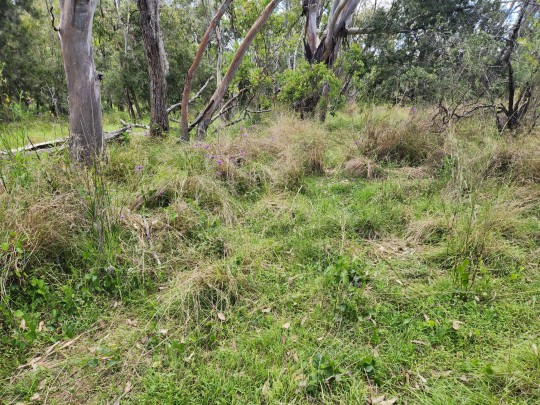
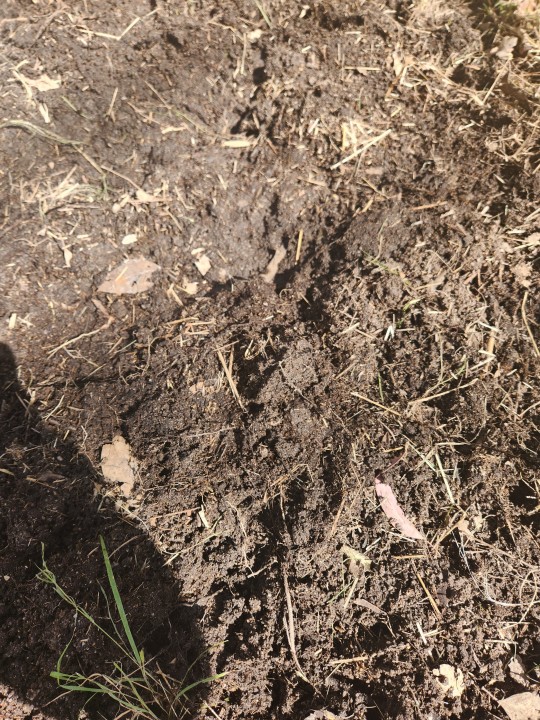
#australian#australia#bush#australian bush#gardenblr#gardening#growing#fruits and vegetables#vege garden#soil#edible gardening#garden#gardeners on tumblr#homesteading#organic
5 notes
·
View notes
Text
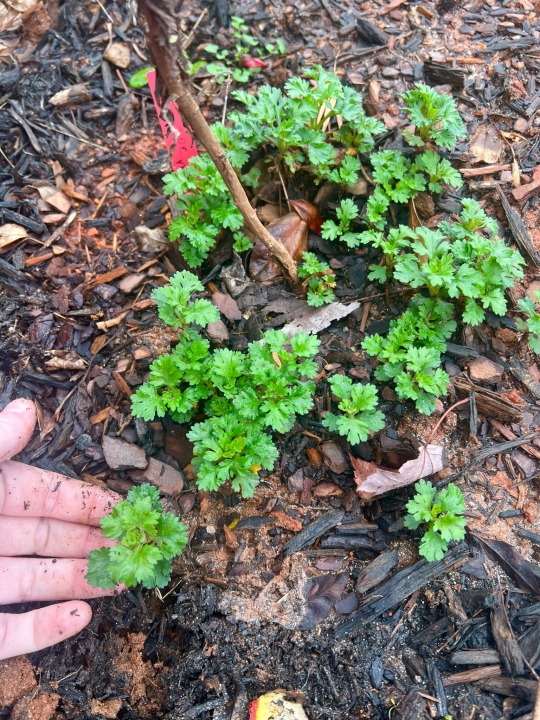
3/3/24 ~ the Sue Mum I got back in October is spreading new growth like crazy! Tons of lil babies 🌱
#Sue mum#mum bush#mums#indoor garden#container gardening#sustainable gardening#vegetable gardening#starting seeds#growing food#perennial plants#ornamental#landscape#grow your own food#organic gardening#plant life#soil health
1 note
·
View note
Link
Ready to embark on a journey of health, sustainability, and joy? 🌱 Dive into our latest article: "How to Grow Your Own Organic Vegetable Garden" and discover step-by-step tips on creating your thriving oasis. From soil health to pest management, learn the secrets of sustainable gardening and bring nature's bounty to your table. It's time to green your thumb and nourish your soul! #OrganicVegetableGardening #SustainableLiving #GreenThumb
0 notes
Text
#fertilizer#agriculture#organic#organicfertilizer#soil#farming#gardening#bajanas#lawncare#garden#plants#hydroponics#pertanian#horticulture#lawn#grass#kebunbandar#farm#vegetables#growyourown#petani#bajabunga#urbangarden#farmer#plantlover#malaysia#bajabuah#nutrients#banana#orchid
0 notes
Text
Goat Manure vs Other Animal Manure: Which is Better for Your Garden?

Goat Manure vs Other Animal Manure: Which is Better for Your Garden?

How To Grow

Fertilizer

Shop Seeds
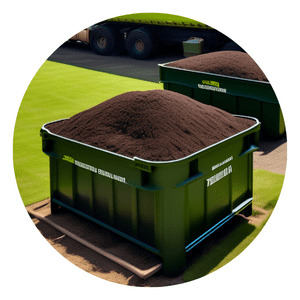
Shop Fertilizer
When it comes to growing a successful garden, many seek out the best fertilizer that can provide their plants with the nutrients they need.
Goats are often used as a source of fertilizer due to their advantages over other animals, such as cows and horses.
But how does goat manure compare to other animal manures?
In this article, we will discuss the differences between goat manure and other animal manures in terms of nutrient content, application methods, cost, and environmental impact.
https://www.youtube.com/watch?v=873zn7yiRY8
Goat Manure Menu
Benefits of using animal manure in gardening
Goat manure is one of the most beneficial types of animal manure for gardening.
It contains high levels of nitrogen, phosphorus, and potassium, making it an excellent fertilizer for plants.
In addition to these essential nutrients, goat manure also contains a range of micronutrients that are vital for plant growth and development.
Compared to other types of animal manures, such as cow or chicken manure, goat manure has a lower risk of introducing harmful bacteria into your garden.
This is because goats have a unique digestive system that produces less harmful pathogens than cows or chickens.
As a result, using goat manure in your garden is safer and more environmentally friendly.
Another benefit of using goat manure in your garden is that it can improve soil structure and moisture retention.
The organic matter in the manure helps to break up compacted soils and improve drainage.
It also increases the water-holding capacity of the soil by increasing its ability to retain moisture during dry periods.
Overall, incorporating goat manure into your gardening routine can lead to healthier plants and better yields come harvest time.
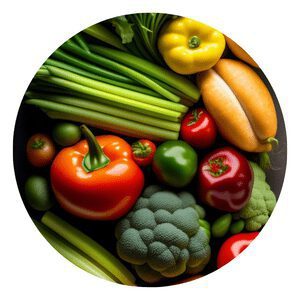
Create a One-of-a-Kind Garden with Our Range of Artistic Seeds
The nutrients and minerals found in animal manure
Goat manure is one of the best fertilizers for your garden.
It contains a variety of nutrients and minerals that are essential for plant growth, such as nitrogen, phosphorus, and potassium.
Nitrogen helps plants grow their green foliage, while phosphorus promotes root development and flowering.
Potassium improves overall plant health and helps them withstand drought and other environmental stresses.
Aside from these three main nutrients, goat manure also contains trace elements like calcium, magnesium, sulfur, zinc, and iron.
These minerals are important for proper plant growth because they help with photosynthesis, enzyme activity regulation in cells, chlorophyll production in leaves and more.
Compared to other animal manures like cow or chicken manure which can be too strong or hot due to high nitrogen content that can burn plants when used fresh or undecomposed; goat manure has a balanced nutrient composition making it ideal for use in gardens without causing damage to the plants.
It's also easier to handle than some other types of animal waste products since it isn't as bulky or smelly.

Transform Your Garden into a Masterpiece with Artistic Design & Rare Tomatoes
How animal manure can improve soil health
Animal manure is a great natural fertilizer that can improve soil health in your garden.
It adds essential nutrients to the soil, such as nitrogen, phosphorus, and potassium.
The key is choosing the right type of manure for your garden.
When it comes to goat manure vs other animal manures, goat manure is particularly beneficial because it has high levels of nitrogen, which promotes leafy growth in plants.
Additionally, goat manure breaks down quickly and easily in the soil compared to other types of animal manures that may take longer to degrade.
This means that the nutrients are released more rapidly into the soil and are more readily available for plant uptake.
Goat manure also tends to have a lower salt content than other types of animal manures, making it less likely to burn plant roots or damage seedlings.
However, regardless of whether you choose goat or another type of animal manure for your garden, using it as a fertilizer can help maintain healthy soil by increasing organic matter content and improving overall fertility.
Regular use of animal manure can also enhance water retention capacity in soils while reducing erosion rates due to improved structure and stability.
Goat manure stands out more than the rest,
In terms of your garden, it truly is the best.
It's filled with essential nutrients to help your plants thrive,
Stimulating growth with an aerobic life.
So forget about other animals' poo,
Rabbit or cow doesn't quite measure up to you.
Goats provide a great fertilizer for your land,
For blooms of roses and precious fruits you stand.
Chappy The Gardener

Online Shop
Comparison between goat manure and other animal manure
When it comes to organic gardening, the type of fertilizer you choose can make a significant difference in the growth and health of your plants.
Animal manure is a popular choice for many gardeners because it is rich in nutrients and can help improve soil quality. However, not all animal manures are created equal.
First, let's start with cow manure.
Cow manure is a popular choice among gardeners because it is widely available and relatively affordable. It is also high in nitrogen, which is essential for plant growth.
However, cow manure can also be high in salts and may contain weed seeds, which can be problematic for gardeners.
Pig manure is another common type of animal manure used in gardening. It is high in nitrogen and phosphorus, which can help promote plant growth.
However, pig manure can also be high in ammonia, which can be harmful to plants if not properly composted.
Now, let's take a closer look at goat manure.
Goat manure is a great choice for organic gardeners because it is high in nitrogen, phosphorus, and potassium, which are essential for plant growth.
It is also low in salts and does not contain weed seeds, making it a cleaner option for your garden.
Goat manure is also easy to compost, and can quickly break down into a rich, nutrient-dense fertilizer for your plants.
One potential drawback of goat manure is that it may be harder to find than other types of animal manure.
However, many farmers and homesteaders who raise goats are happy to share their excess manure with local gardeners.
While all types of animal manure can be beneficial for your garden, goat manure offers several unique advantages.
It is nutrient-dense, low in salts, and easy to compost, making it an excellent choice for organic gardeners.
So, the next time you are looking for a natural fertilizer for your garden, consider giving goat manure a try!
Get Your Hands on Rare and Beautiful Eggplant Seeds - Enter the Category Now
Comparison of nutrient levels and mineral content in different types of animal manure
Animal manure is a popular organic fertilizer among gardeners due to its high nutrient content and ability to improve soil health.
However, not all types of animal manure are equal in terms of nutrient levels and mineral content.
Chicken manure is one of the most commonly used types of animal manure in gardening.
It is high in nitrogen, phosphorus, and potassium, which are essential macronutrients for plant growth.
Chicken manure is also rich in calcium, magnesium, and sulfur, which are important secondary macronutrients.
Additionally, chicken manure is a good source of micronutrients such as zinc, copper, and iron.
Cow manure is another popular choice for gardeners.
It is high in nitrogen and potassium, but typically lower in phosphorus than chicken manure.
Cow manure is also a good source of calcium, magnesium, and sulfur, and contains a range of micronutrients.
Pig manure is similar to cow manure in terms of nutrient levels, but is typically higher in phosphorus.
It also contains a range of micronutrients, although it may be higher in heavy metals than other types of manure.
Horse manure is high in nitrogen and phosphorus, and is also a good source of potassium.
However, it is typically lower in micronutrients than other types of manure.
Sheep and goat manure are both high in nitrogen, phosphorus, and potassium, and are also good sources of calcium, magnesium, and sulfur.
They are typically lower in micronutrients than chicken or pig manure.
In terms of mineral content, all types of animal manure contain a range of minerals that are beneficial for plant growth, including calcium, magnesium, sulfur, and micronutrients such as zinc and iron.
However, the specific mineral content can vary depending on factors such as the animal's diet and the soil in which they are raised.
While all types of animal manure can be beneficial for your garden, they each offer unique nutrient and mineral profiles that may make them more suitable for specific soil types or plant species.
By understanding the nutrient and mineral content of different types of animal manure, gardeners can choose the best option to meet their specific needs.

Discover the perfect garden decorations
The potential risks associated with using certain types of animal manure
While using animal manure may provide excellent benefits for your garden, it is important to be aware of the potential risks associated with certain types.
Some types of animal manure are high in salts, which can cause soil salinity and inhibit plant growth.
Additionally, some animals may carry harmful pathogens like E. coli or salmonella in their feces that can contaminate the soil and potentially spread to crops.
When it comes to goat manure specifically, there are some unique risks to consider.
Goats have a reputation for being escape artists and may wander into areas where they shouldn't be grazing - including pastures treated with herbicides or other chemicals that could end up in their manure.
Additionally, if goats are fed a diet high in copper supplements (which is often recommended), their manure may contain high levels of copper that could be toxic to plants if used too heavily.
Of course, these risks don't mean you should avoid using animal manure altogether - but rather that you should take precautions when incorporating it into your gardening routine.
Consider composting your manure before use to reduce the risk of pathogen contamination and allow any excess salts or toxins time to break down.
And always test your soil regularly to ensure you're not inadvertently causing imbalances or damage through heavy use of any type of fertilizer.

Add Artistic Flair to Your Garden with Beautiful Cucumber Varieties
Advantages of using goat manure in gardening
Goat manure is considered one of the best organic fertilizers for gardening.
It has a balanced ratio of nitrogen, phosphorus, and potassium (NPK), which are essential nutrients for plant growth.
Nitrogen helps in the development of green leaves and stems, phosphorus promotes root growth, and potassium strengthens plants' resistance to diseases and stress.
Unlike other animal manures such as cow or horse manures that need to be aged before applying to plants, goat manure can be used immediately since it doesn't contain high levels of ammonia that can burn roots.
Goat manure also contains a high amount of micronutrients such as calcium, magnesium, zinc, copper, and sulfur that are vital for healthy soil structure.
The presence of these micronutrients enhances soil fertility by improving its water-holding capacity and reducing erosion risks.
Additionally, goat manure has a low carbon-to-nitrogen ratio (C:N) compared to other animal manures like chicken or pig manures.
A low C:N ratio means that it decomposes faster in the soil than other organic matter hence releasing nutrients quickly.

See the amazing results for yourself!
How goat manure can improve plant growth and health
Goat manure is a nutrient-rich organic fertilizer that can significantly improve plant growth and health.
Unlike chemical fertilizers, which can harm soil health and the environment, goat manure is a natural and sustainable option that provides a range of benefits for your garden.
One of the main benefits of goat manure is its high nutrient content.
Goat manure is rich in nitrogen, phosphorus, and potassium, which are essential macronutrients that plants need to grow and thrive.
Nitrogen is necessary for leaf and stem growth, while phosphorus is crucial for root development and flower and fruit production.
Potassium helps regulate plant metabolism and enhances stress tolerance.
Goat manure also contains a range of micronutrients that are essential for plant health, including calcium, magnesium, sulfur, and a variety of trace minerals.
These micronutrients are often lacking in synthetic fertilizers and can be difficult to obtain through other natural sources.
In addition to its nutrient content, goat manure can also improve soil structure and fertility.
When added to soil, goat manure increases soil organic matter, which helps to retain moisture and nutrients.
Read the full article
0 notes
Photo
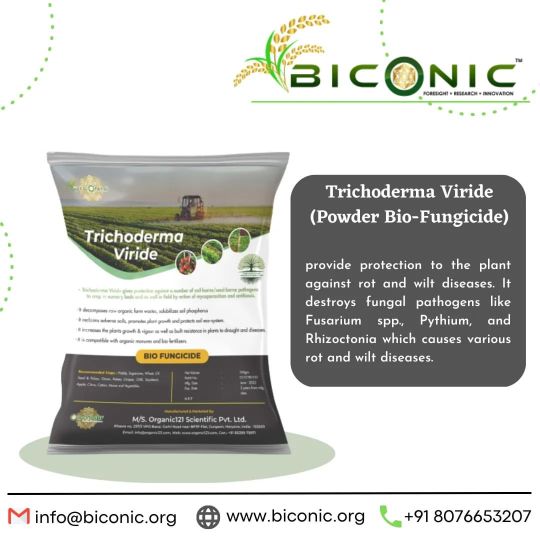
Biconic Trichoderma Viride(Powder Bio-Fengicide) Provide protection to the plant against rot and wilt diseases. It destroys fungal pathogens like fusarium spp. Pythium, and Rhizoctonia which causes various rot and wilt diseases. For Bulk Order:- +91 8076653207 Mail on :- [email protected] @biconic121bio . . . . .#fertilizer #agriculture #organic #organicfertilizer #soil #farming #gardening #bajanas #lawncare #garden #plants #hydroponics #pertanian #horticulture #lawn #grass #kebunbandar #farm #vegetables #growyourown #petani #bajabunga #urbangarden #farmer #plantlover #malaysia #bajabuah #nutrients #banana #orchid (at Biconic Biofertilizers and Biopesticides) https://www.instagram.com/p/CpMs6IOPdjB/?igshid=NGJjMDIxMWI=
#fertilizer#agriculture#organic#organicfertilizer#soil#farming#gardening#bajanas#lawncare#garden#plants#hydroponics#pertanian#horticulture#lawn#grass#kebunbandar#farm#vegetables#growyourown#petani#bajabunga#urbangarden#farmer#plantlover#malaysia#bajabuah#nutrients#banana#orchid
1 note
·
View note
Text
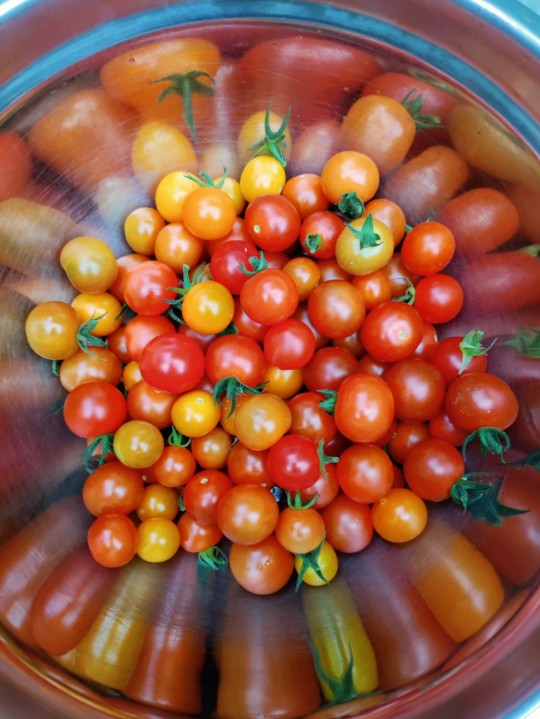
Another large harvest of Sun Burst and Cherry Tomatoes
2 notes
·
View notes
Photo

This pile of dirt in the ornamental garden started life 9 months ago.
It is about 1 metre wide and 30cm high.
It began as a load of spent potting soil which I dumped there to deal with it. I had intended to spread the dirt out.
But then I changed my mind and added a few amendments and dug it over.
Last Summer it supported 5 huge squash plants that fruited heavily.
At the end of Summer the pile had shrunk. So more old soil and some chook poo pellets went in.
On the 3rd day of Autumn I stuck a heap of sprouting potatoes in the pile, mulched the top, watered and basically forgot about it.
On the 3rd day of Winter I pulled up an amazing harvest of off season potatoes.
This mound of recycled soil hiding amongst the nasturtiums is really pulling its weight. I’m learning a lot from the experience and this method of growing too.
#soil#garden#gardeners on tumblr#grow it yourself#home grown#plants#vegetables#no dig gardening#recycled soil#organic food
5 notes
·
View notes
Text
"Any good gardener knows what a good de-weeding can do for a vegetable garden. As it turns out, it’s much the same for coral reefs.
Following a volunteer “sea-weeding” program launched in Australia, scientists are witnessing compounding coral recovery both in quantity and diversity, and suggest that this simple method has the power to transform degraded reefs overrun by macroalgae.
In a balanced ecosystem, macroalgae is kept in check by the size and health of corals, but as extreme weather events or coral bleaching causes some sections of reef to die, macroalgae has no other neighbor keeping a check on its spread.
Over a period of three years, the joint Earthwatch Institute program led by James Cook University Senior Research Officer Hillary Smith and Professor David Bourne, also at JCU and the Australian Institute of Marine Science, has organized volunteer citizen scientists to help remove macroalgae at two experimental reef sites.
The results of the first three years of work and study have now been published in the Journal of Applied Ecology, and they show a 600% increase in coral recovery rates.
“It’s just like weeding your garden,” Smith said. “Every time we return, the seaweed is growing back less and less, so this method could provide lasting benefit without requiring endless effort.” ...
The importance of the study, Smith details, is that a lot of reef recovery efforts globally are powered by expensive, high-tech, and experimental solutions. The study hoped to show that manual de-weeding was just as effective, and thereby encourage organizations or nations that lack the tech or funding of a country like Australia to pursue sea-weeding as a way of protecting their corals.
“We have yet to see a plateau in coral growth within these plots at Magnetic Island, which is characterized as one of the degraded reefs on the Great Barrier Reef,” Smith said. “We also found an increase in coral diversity, so this method is benefitting a wide range of different coral types.”
Smith said her team are now scoping other locations where the sea-weeding technique could be useful, including the Whitsunday Islands, which are home to a different species of predominant seaweed.
They also want to employ them in French Polynesia, Indonesia, and even Singapore, where experts have identified out-of-control macroalgae spread along coral reefs."
-via Good News Network, September 19, 2023
#algae#seaweed#coral#coral reef#great barrier reef#australia#biodiversity#ecosystem restoration#ecosystem#good news#hope#hope posting
4K notes
·
View notes
Text
How to grow tomatoes
Tomatoes are a popular and versatile vegetable that are easy to grow in a home garden. They come in a variety of shapes, sizes, and colors, and can be used in a wide range of dishes, from salads to sauces.
To start growing tomatoes, it is important to choose a sunny location with well-drained soil. Tomatoes require at least 6 hours of direct sunlight per day to grow properly. The soil should also be rich in organic matter and have a pH between 6.0 and 7.0.
Before planting your tomatoes, you should prepare the soil by adding compost or well-rotted manure to improve its fertility. You can also add a balanced fertilizer, such as 10-10-10, to the soil before planting to give your tomatoes a nutrient boost.
When it comes to choosing the right tomato variety to grow, there are many options available, including determinate and indeterminate varieties. Determinate varieties tend to be bushier and smaller, and they produce all of their fruit at once. Indeterminate varieties are taller and vine-like, and they produce fruit throughout the growing season.
Once you have chosen your tomato variety and prepared the soil, it's time to plant your seeds or seedlings. You should plant them about 1 inch deep and 3 feet apart, and be sure to water them well. As the plants grow, you will need to stake or cage them to keep them from falling over.
After your tomatoes have been planted, it's important to give them the proper care to ensure they grow and produce well. This includes regular watering, fertilizing, and pruning.
Watering is one of the most important aspects of growing tomatoes, as they require consistent moisture to thrive. You should water your plants deeply about once a week, making sure the soil stays consistently moist but not waterlogged.
Fertilizing your plants with a balanced tomato fertilizer or compost tea every 4 to 6 weeks will also help them grow strong and produce a bountiful crop. Be careful not to over-fertilize, as this can lead to leafy growth at the expense of fruit production.
Pruning your tomatoes will help to improve their overall health and productivity. You should remove the suckers that grow in the crotches of branches, as well as any yellow or diseased leaves.
Diseases and pests are common problems that can affect tomatoes. To prevent these issues, it is important to rotate your crops each year and to keep the garden clean and free of debris.
Another important aspect of growing tomatoes is staking or caging them. As the plants grow, their stems will become weak and will require support to keep them upright. Staking or caging will help to keep the fruit off the ground, which will reduce the risk of disease and rot.
With proper care and attention, your tomato plants should begin to produce fruit within about 6-8 weeks. Once the tomatoes start to ripen, be sure to harvest them regularly to keep the plants producing. Tomatoes should be picked when they are fully ripe and still firm.
Growing tomatoes is a rewarding experience that can provide you with fresh, delicious fruits for your meals. By providing your plants with the right growing conditions, proper care, and attention to detail, you can enjoy a bountiful crop of tomatoes all season long.
Overall, Tomatoes are one of the most beloved crops of home gardeners and they are relatively easy to grow and maintain. By following the guidelines mentioned above, you will increase your chance of harvesting abundant and tasty tomatoes.
#Tomato cultivation#Home gardening#Vegetable gardening#Organic gardening#Tomato varieties#Tomato planting#Tomato care#Watering tomatoes#Fertilizing tomatoes#Pruning tomatoes#Staking tomatoes#Caging tomatoes#Harvesting tomatoes#Tomato diseases#Tomato pests#Soil preparation#Companion planting#Garden rotation#Sunlight requirements#pH levels#Tomato recipes#Heirloom tomatoes#Determinate tomatoes#Indeterminate tomatoes#Greenhouse tomatoes#Container tomatoes#Hydroponic tomatoes#Tomatoes for canning#Tomatoes for sauce#Tomato nutrition.
1 note
·
View note
Text
At Beaver Compost, our mission is to provide the highest quality products and services to all of our customers. We are committed to being an honest and transparent compost company. We believe in working with our customers in a friendly and professional manner, while delivering the highest quality organic compost ,organic soil, manure vegetable and garden soil products available. Visit us online now.
0 notes